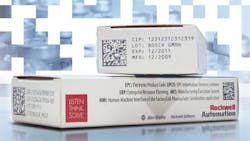Proliferation of dangerous counterfeit medication is a global concern. Impending regulations across markets will require pharmaceutical, medical device and consumer packaged goods manufacturers to trace products down to the individual saleable unit across the supply chain. Rockwell Automation has introduced its new holistic serialization solution to help manufacturers comply with these regulations. The offering can strengthen supply chains and produce a number of business benefits beyond compliance.
The holistic serialization solution, powered by PharmaSuite MES software from Rockwell Automation, is fully integrated across all four enterprise and control system levels of the ISA-95 data model. The solution leverages the Microsoft Azure cloud-computing platform and services, and seamlessly connects and shares data. Data is shared between the plant floor, the enterprise, supply-chain partners and the retail point of sale – and potentially, right to the customer. The common serialization data thread, which provides real-time visibility to a company’s products and customers, can increase the efficiency and productivity of all departments in The Connected Enterprise, from manufacturing, quality and finance to supply chain, logistics and marketing.
“Life sciences – as well as many food, beverage and consumer packaged goods – companies must implement or upgrade track-and-trace systems to meet the growing number of serialization regulations worldwide,” said Joe Whyte, global serialization lead for Rockwell Automation. “Our serialization solution offers manufacturers compliance, but also helps manufacturers to achieve real commercial and business benefits. The offering can help manufacturers avoid millions in inaccurate chargeback or rebate payments, and add millions in revenue by eliminating gray market product diversions. The system can reduce the cost and improve the accuracy of product recalls. Production rates that are driven by real-time consumption data can lead to optimized manufacturing and supply-chain inventories. Once the common data thread is understood, the benefits beyond compliance are nearly limitless.”
Many existing “black box” serialization solutions were custom developed, created at the machine or enterprise levels. These systems often result in integration challenges with batch-, processing- or plant-level systems, and can be difficult to maintain long-term. The holistic serialization solution from Rockwell Automation is designed for interoperability across every level. That includes integrating with different controllers, networks and serialization devices on the production line, as well as with MES and ERP systems at the site and enterprise levels.
Life sciences – as well as many food, beverage and consumer packaged goods – companies must implement or upgrade track-and-trace systems to meet the growing number of serialization regulations worldwide.— Joe Whyte, global serialization lead for Rockwell Automation.
As a standard solution, the system integrates into existing production lines to help minimize production interruptions and validation burdens. Additionally, Rockwell Automation offers remote-support capabilities, including real-time diagnostics monitoring and application-level support, to help minimize potential downtime for this mission-critical asset.
The holistic serialization solution uses a GS1 Electronic Product Code Information Services (EPCIS)-certified platform from Covectra Inc. of Westborough, Massachusetts. The EPCIS-certified platform provides global serial-number generation and supply-chain event repository data management with business benefit applications that include downstream track and trace, consumer authentication, patient adherence and patient outcome monitoring.
Rockwell Automation is collaborating with Strategic Alliance Partner Microsoft, a valued member of the Rockwell Automation PartnerNetwork program, to deliver cloud-based, remote-monitoring services and information solutions to bring together business and manufacturing intelligence worldwide. The system is hosted in the Microsoft Azure cloud platform, increasing data accessibility and reducing or sometimes eliminating the need for capital investment to design and maintain a physical data-storage infrastructure. The Azure platform has achieved the highest levels of international certification and accreditation, including ISO 27001 and SOC2/SOC3.
